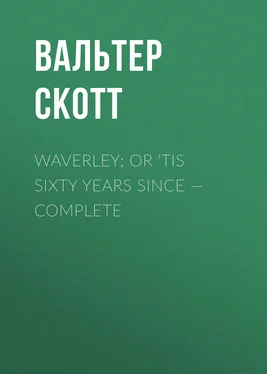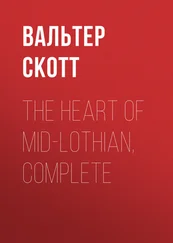Вальтер Скотт - Waverley; Or 'Tis Sixty Years Since — Complete
Здесь есть возможность читать онлайн «Вальтер Скотт - Waverley; Or 'Tis Sixty Years Since — Complete» — ознакомительный отрывок электронной книги совершенно бесплатно, а после прочтения отрывка купить полную версию. В некоторых случаях можно слушать аудио, скачать через торрент в формате fb2 и присутствует краткое содержание. Издательство: Иностранный паблик, Жанр: foreign_prose, foreign_antique, на английском языке. Описание произведения, (предисловие) а так же отзывы посетителей доступны на портале библиотеки ЛибКат.
- Название:Waverley; Or 'Tis Sixty Years Since — Complete
- Автор:
- Издательство:Иностранный паблик
- Жанр:
- Год:неизвестен
- ISBN:нет данных
- Рейтинг книги:3 / 5. Голосов: 1
-
Избранное:Добавить в избранное
- Отзывы:
-
Ваша оценка:
- 60
- 1
- 2
- 3
- 4
- 5
Waverley; Or 'Tis Sixty Years Since — Complete: краткое содержание, описание и аннотация
Предлагаем к чтению аннотацию, описание, краткое содержание или предисловие (зависит от того, что написал сам автор книги «Waverley; Or 'Tis Sixty Years Since — Complete»). Если вы не нашли необходимую информацию о книге — напишите в комментариях, мы постараемся отыскать её.
Waverley; Or 'Tis Sixty Years Since — Complete — читать онлайн ознакомительный отрывок
Ниже представлен текст книги, разбитый по страницам. Система сохранения места последней прочитанной страницы, позволяет с удобством читать онлайн бесплатно книгу «Waverley; Or 'Tis Sixty Years Since — Complete», без необходимости каждый раз заново искать на чём Вы остановились. Поставьте закладку, и сможете в любой момент перейти на страницу, на которой закончили чтение.
Интервал:
Закладка:
The view of the old tower, or fortalice, introduced some family anecdotes and tales of Scottish chivalry, which the Baron told with great enthusiasm. The projecting peak of an impending crag which rose near it had acquired the name of Saint Swithin's Chair. It was the scene of a peculiar superstition, of which Mr. Rubrick mentioned some curious particulars, which reminded Waverley of a rhyme quoted by Edgar in King Lear; and Rose was called upon to sing a little legend, in which they had been interwoven by some village poet,
Who, noteless as the race from which he sprung,
Saved others' names, but left his own unsung.
The sweetness of her voice, and the simple beauty of her music, gave all the advantage which the minstrel could have desired, and which his poetry so much wanted. I almost doubt if it can be read with patience, destitute of these advantages, although I conjecture the following copy to have been somewhat corrected by Waverley, to suit the taste of those who might not relish pure antiquity.
On Hallow-Mass Eve, ere ye boune ye to rest,
Ever beware that your couch be bless'd;
Sign it with cross, and sain it with bead,
Sing the Ave, and say the Creed.
For on Hallow-Mass Eve the Night-Hag will ride,
And all her nine-fold sweeping on by her side,
Whether the wind sing lowly or loud,
Sailing through moonshine or swath'd in the cloud.
The Lady she sat in Saint Swithin's Chair,
The dew of the night has damp'd her hair:
Her cheek was pale; but resolved and high
Was the word of her lip and the glance of her eye.
She mutter'd the spell of Swithin bold,
When his naked foot traced the midnight wold,
When he stopp'd the Hag as she rode the night,
And bade her descend, and her promise plight.
He that dare sit on Saint Swithin's Chair,
When the Night-Hag wings the troubled air,
Questions three, when he speaks the spell,
He may ask, and she must tell.
The Baron has been with King Robert his liege
These three long years in battle and siege;
News are there none of his weal or his woe,
And fain the Lady his fate would know.
She shudders and stops as the charm she speaks;—
Is it the moody owl that shrieks?
Or is it that sound, betwixt laughter and scream,
The voice of the Demon who haunts the stream?
The moan of the wind sunk silent and low,
And the roaring torrent had ceased to flow;
The calm was more dreadful than raging storm,
When the cold grey mist brought the ghastly Form!
'I am sorry to disappoint the company, especially Captain Waverley, who listens with such laudable gravity; it is but a fragment, although I think there are other verses, describing the return of the Baron from the wars, and how the lady was found "clay-cold upon the grounsill ledge.'"
'It is one of those figments,' observed Mr. Bradwardine, 'with which the early history of distinguished families was deformed in the times of superstition; as that of Rome, and other ancient nations, had their prodigies, sir, the which you may read in ancient histories, or in the little work compiled by Julius Obsequens, and inscribed by the learned Scheffer, the editor, to his patron, Benedictus Skytte, Baron of Dudershoff.'
'My father has a strange defiance of the marvellous, Captain Waverley,' observed Rose, 'and once stood firm when a whole synod of Presbyterian divines were put to the rout by a sudden apparition of the foul fiend.'
Waverley looked as if desirous to hear more.
'Must I tell my story as well as sing my song? Well—Once upon a time there lived an old woman, called Janet Gellatley, who was suspected to be a witch, on the infallible grounds that she was very old, very ugly, very poor, and had two sons, one of whom was a poet and the other a fool, which visitation, all the neighbourhood agreed, had come upon her for the sin of witchcraft. And she was imprisoned for a week in the steeple of the parish church, and sparely supplied with food, and not permitted to sleep until she herself became as much persuaded of her being a witch as her accusers; and in this lucid and happy state of mind was brought forth to make a clean breast, that is, to make open confession of her sorceries, before all the Whig gentry and ministers in the vicinity, who were no conjurors themselves. My father went to see fair play between the witch and the clergy; for the witch had been born on his estate. And while the witch was confessing that the Enemy appeared, and made his addresses to her as a handsome black man,—which, if you could have seen poor old blear-eyed Janet, reflected little honour on Apollyon's taste,—and while the auditors listened with astonished ears, and the clerk recorded with a trembling hand, she, all of a sudden, changed the low mumbling tone with which she spoke into a shrill yell, and exclaimed, "Look to yourselves! look to yourselves! I see the Evil One sitting in the midst of ye." The surprise was general, and terror and flight its immediate consequences. Happy were those who were next the door; and many were the disasters that befell hats, bands, cuffs, and wigs, before they could get out of the church, where they left the obstinate prelatist to settle matters with the witch and her admirer at his own peril or pleasure.'
'Risu solvuntur tabulae,' said the Baron; 'when they recovered their panic trepidation they were too much ashamed to bring any wakening of the process against Janet Gellatley.' [Footnote: See Note 11]
This anecdote led to a long discussion of
All those idle thoughts and fantasies,
Devices, dreams, opinions unsound,
Shows, visions, soothsays, and prophecies,
And all that feigned is, as leasings, tales, and lies.
With such conversation, and the romantic legends which it introduced, closed our hero's second evening in the house of Tully-Veolan.
CHAPTER XIV
The next day Edward arose betimes, and in a morning walk around the house and its vicinity came suddenly upon a small court in front of the dog-kennel, where his friend Davie was employed about his four-footed charge. One quick glance of his eye recognised Waverley, when, instantly turning his back, as if he had not observed him, he began to sing part of an old ballad:—
Young men will love thee more fair and more fast;
Heard ye so merry the little bird sing?
Old men's love the longest will last,
And the throstle-cock's head is under his wing.
The young man's wrath is like light straw on fire;
Heard ye so merry the little bird sing?
But like red-hot steel is the old man's ire,
And the throstle-cock's head is under his wing.
The young man will brawl at the evening board;
Heard ye so merry the little bird sing?
But the old man will draw at the dawning the sword,
And the throstle-cock's head is under his wing.
Waverley could not avoid observing that Davie laid something like a satirical emphasis on these lines. He therefore approached, and endeavoured, by sundry queries, to elicit from him what the innuendo might mean; but Davie had no mind to explain, and had wit enough to make his folly cloak his knavery. Edward could collect nothing from him, excepting that the Laird of Balmawhapple had gone home yesterday morning 'wi' his boots fu' o' bluid.' In the garden, however, he met the old butler, who no longer attempted to conceal that, having been bred in the nursery line with Sumack and Co. of Newcastle, he sometimes wrought a turn in the flower-borders to oblige the Laird and Miss Rose. By a series of queries, Edward at length discovered, with a painful feeling of surprise and shame, that Balmawhapple's submission and apology had been the consequence of a rencontre with the Baron before his guest had quitted his pillow, in which the younger combatant had been disarmed and wounded in the sword arm.
Читать дальшеИнтервал:
Закладка:
Похожие книги на «Waverley; Or 'Tis Sixty Years Since — Complete»
Представляем Вашему вниманию похожие книги на «Waverley; Or 'Tis Sixty Years Since — Complete» списком для выбора. Мы отобрали схожую по названию и смыслу литературу в надежде предоставить читателям больше вариантов отыскать новые, интересные, ещё непрочитанные произведения.
Обсуждение, отзывы о книге «Waverley; Or 'Tis Sixty Years Since — Complete» и просто собственные мнения читателей. Оставьте ваши комментарии, напишите, что Вы думаете о произведении, его смысле или главных героях. Укажите что конкретно понравилось, а что нет, и почему Вы так считаете.












